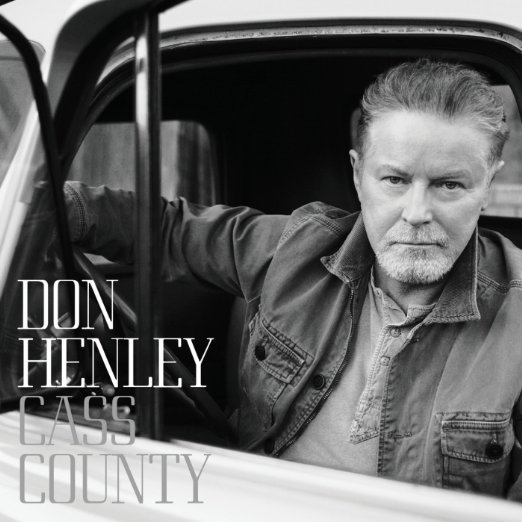Music |
Don Henley: Cass County
By
Published: Oct 27, 2015
Category:
Country
Guest Butler Joe DePreta is a New York marketing executive and writer on cultural trends.
I’m an Eagles fan.
If you say that, people often snicker. That’s because the Eagles are one of the most polarizing bands in rock history — music fans and critics either love them or hate them. Do you remember, in “The Big Lebowski,” how “The Dude” snarked the Eagles? He’s riding in a taxi, nursing a flagitious hangover while “Peaceful Easy Feeling” is blaring on the radio. He says to the driver, “Come on man, I had a rough night. Can you change the channel? I hate the fucking Eagles.”
For context, when their first album was released in 1971, the popular music bar was woefully low — one of the biggest songs of that year was Three Dog Night’s “Joy to the World” (i.e. “Jeremiah was a bullfrog”). When I heard the Eagles do “Witchy Woman,” I played it again. The lead vocal was at once pleading, vulnerable, confrontational, melancholy and soulful, full of nuance and range. And I became an Eagles fan.
It’s more accurate to say I became a Don Henley fan. As the band progressed, he wrote and performed the Eagles’ most iconic songs — “Desperado,” “One of These Nights,” “Best of My Love,” “Hotel California,” “Wasted Time,” “Life In the Fast Lane,” “The Long Run.” The deities kissed his voice, an incongruous amalgam of soul, country, rock and blues. Instantly identifiable, he makes you feel, and think. Other than Paul Simon, Leonard Cohen and perhaps Randy Newman, Henley has few peers in that realm.
Since the Eagles’ initial breakup in 1980, Henley’s solo career left his former band mates standing on that storied corner in Winslow, Arizona. His three solo albums of the 1980s were critical, commercial and artistic successes. His first solo tour in 1985 found him dancing a well-choreographed tango with a back-up singer during the “Hotel California” instrumental crescendo. He managed to surprise, engage, entertain and provide the aural splendor people came to expect, while cross-pollinating genres from reggae to gospel to punk. With each subsequent album, his taste level never compromised and his songwriting grew complex and vivid, evolving his exigent demands for vocal and lyrical perfection while challenging political ideals. “Dirty Laundry,” a prescient take on the news media, is more telling today than it was upon its release in 1982.
“Cass County,” his new CD, draws on the Americana of his East Texas upbringing. Henley has managed to capture the textures, environments, dreams and cultural imperatives of this landscape and framed them in a redefined modernism. Is it country? Perhaps. But more to the point, Henley is country, so all 16 songs have a natural poignancy that stirs the spirit. You’ll hear a pedal steel guitar on most tracks, a melancholy underpinning that weaves a tapestry of elegance and yearning, adding juxtaposition to the lyrics.
Simply put, it is, for me, the best album in 15 years. [To buy the CD from Amazon, click here. To buy the MP3 download, click here.]
Much has been written about the A-list cast performing with Henley on “Cass County” — Mick Jagger, Merle Haggard, Dolly Parton, Vince Gill, Alison Krauss, Lucinda Williams, Miranda Lambert, Martina McBride, Trisha Yearwood. I was fearful that the all-star team would weigh the album down with too much heft, like a Garry Marshall holiday film. But their chorale contributions are an aural delight, with meaning and relevance connected by a common thread of a life in full.
The CD opens with a cover of Tift Merritt’s “Bramble Rose.” Henley sings the first verse, Lambert sings the second and Jagger closes the third with dignity and grit. The stripped-down production adds a rustic lament of authenticity.
Louis Armstrong once said, “There is two types of music, the good and the bad. I play the good.” The same could be said for Henley, and like his earlier albums, there’s never a “bad” or throwaway song –– only great ones that are different.
Henley doesn’t shy away from contemporary topics and ill-conceived societal trends. “Praying for Rain,” is about a farmer who’s witnessed a quick winter and a flash of a spring: “Lord I ain’t never asked for much, and I don’t mean to complain, but I’m praying for rain.”
In “That Old Flame,” a former lover reaches out through social media: “Speak to me plain/tell me the truth/is it me you really miss/or just your long lost youth.”)
“Waiting Tables” is a touching but unsentimental tale about a young waitress:
When her working day is done she tallies up her tips
And she sighs, “Dear Lord above, there must be something more than this”
Someday she’ll see the misery in her rear view mirror
But for today she’ll find a way to get along right here
One of the goose bump moments is Henley’s duet with Dolly Parton on the Louvin Brothers 50’s hit “When I Stop Dreaming.” Rendered with such simplicity, passion, sincerity and vocal potency, it can make the most indifferent among us get misty.
The guy is literate and astute. The fist he used to shake at the world can be found on a few songs, like “No Thank You” and the Ray Charles inspired “Too Much Pride,” but it’s a fist of wisdom. Henley hasn’t mellowed; his outlook simply reached a level of acceptance. That acceptance is best expressed on “A Younger Man.”
Now, the merchants in the marketplace
They’re selling fantasy
It’s a trick of light and shadow
It’s not reality
It’s just a faded photograph
Of the man I used to be
You’re lookin’ for a younger man — not me
Fitzgerald allegedly said there are no second acts in American life, while Thomas Wolfe claimed you can’t go home again. With Cass County, Henley has proven them both wrong.


